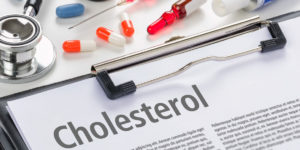 Cholesterol is a fatty substance that your liver produces naturally. 80% of your body’s cholesterol is made by your liver. Your liver produces all the cholesterol that you need, but fats and cholesterol are present in certain animal foods, meat, and cheese we eat nowadays.
Cholesterol is a fatty substance that your liver produces naturally. 80% of your body’s cholesterol is made by your liver. Your liver produces all the cholesterol that you need, but fats and cholesterol are present in certain animal foods, meat, and cheese we eat nowadays.
Every cell in your body needs and contains cholesterol. Your body uses cholesterol to power electrical signals. In fact, the highest concentration of cholesterol in your body is in your brain — a whopping 25%!
- Low Cholesterol is a risk factor for poor memory. One thing that is common to most Alzheimer’s patients is low cholesterol!
- One of the most important jobs of cholesterol is to be an aide in the production of hormones. Cholesterol is stored in the adrenal glands, ovaries, and the testes and is converted to steroid hormones. These steroid hormones perform other vital duties to help the body function properly.
- The liver uses cholesterol to manufacture bile salts which aid us in digesting the food that we eat. Without the bile, our bodies are unable to properly digest foods, especially fats. When the fat goes undigested it can get into the bloodstream and cause additional problems such as blockages of the arteries and cause heart attacks and heart disease.
- Cholesterol along with polar lipids makes up the structure of each and every cell in our bodies. Cholesterol is there to basically provide a protective barrier. When the amount of cholesterol increases or decreases, the cells are affected. This change can affect our ability to metabolize and produce energy.
There are two types of cholesterol: “good” and “bad”:
- HDL (GOOD): it helps to unclog your arteries.
- LDL (BAD): it builds up plaques in your arteries and can cause a stroke or heart attack.
You need healthy levels of cholesterol for proper cell membranes/hormone/vitamin D productions. But if you have too much in your blood, it can combine with other substances in the blood and stick to the walls of your arteries. This is called plaque. Plaque can narrow your arteries or even block them. High levels of cholesterol in the blood can increase your risk of heart disease. Excess cholesterol can form plaque between layers of artery walls, making it harder for your heart to circulate blood. Plaque can break open and cause blood clots. If a clot blocks an artery that feeds the brain, it causes a stroke. If it blocks an artery that feeds the heart, it causes a heart attack. Your cholesterol levels tend to rise as you get older. There are usually no signs or symptoms that you have high blood cholesterol, but it can be detected with a blood test. You are likely to have high cholesterol if members of your family have it, if you are overweight or if you eat a lot of fatty foods. You can lower your cholesterol by exercising more and eating more fruits and vegetables. You may also need to take medicine to lower your cholesterol.
New Generation Medical recommends our patients over 20 years old to have their cholesterol levels checked at least every five years. As we age, cholesterol levels tend to rise. The desirable cholesterol levels are listed below:
- Total cholesterol: Less than 200 mg/dL.
- Low Density Lipoprotein (LDL) cholesterol (“bad” cholesterol): Less than 100 mg/dL.
- High Density Lipoprotein (HDL) cholesterol (“good” cholesterol): 40 mg/dL or higher.
- Triglycerides: Less than 150 mg/dL.
Men are generally at a higher risk than women. However, a woman’s risk goes up after she hits menopause. For those with high cholesterol and additional risk factors (elevated blood pressure, family history of premature heart disease, diabetes mellitus, cigarette smoking), more frequent testing is recommended. It’s important to know the levels of cholesterol in your blood so that you and your doctor can determine the best strategy to lower your risk. Making healthy eating choices and increasing exercise are important first steps in improving your cholesterol. For some people, cholesterol-lowering medication may also be needed to reduce the risk for heart attack and stroke. Use the information provided here to start a conversation with your doctor about how cholesterol affects your heart attack and stroke risk and what you can do to lower your risk.

Leave a Reply